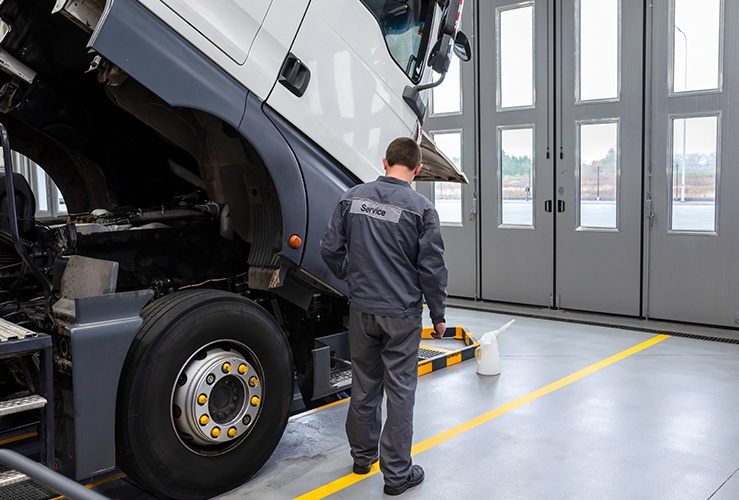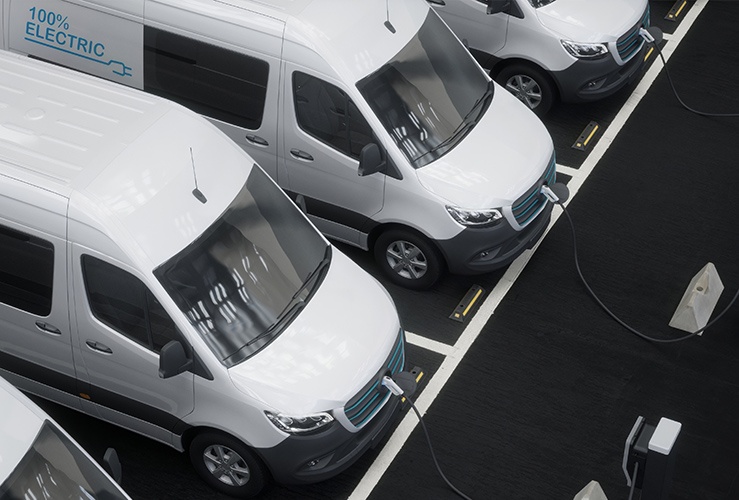Today’s fleet manager has an array of powerful fleet management solutions to stay ahead of the competition in 2024 and beyond. Consider these potent strategies in your quest for effective fleet optimisation.
Change has long been at the heart of the UK fleet management industry, but this has never been truer as we move into the last quarter of 2024 and look towards 2025.
Maintaining high levels of performance has always been a key objective for fleet managers, who are under pressure to get more done for less—while adhering to all new and existing regulations and ensuring safety standards are as high as possible.
Whether you are involved in logistics, last-mile deliveries, public transportation, or other vehicle-based services, the following strategies will help you and your team get a handle on the latest trends in optimising fleet performance and enjoy success in the coming months and years.
Learn how to leverage data analytics, optimise vehicle maintenance, integrate electric and hybrid vehicles, optimise training, get better fuel efficiency, and look at ways to harness telematics—all while meeting your organisation's environmental objectives and responsibilities.
1. Leverage Data Analytics for Informed Decision-Making
“It’s not what you know but who you know” – so goes the old adage. But in fleet management, the latter is just as important as the former. A high-performance fleet has never been more dependent on reliable sources of accurate data. As we move into 2024 and beyond, collecting real-time data is of paramount importance, enabling you and your team to understand how your fleet is operating and to inform decisions that boost performance and reduce costs. Today’s fleet management solutions and telematics systems can gather a wealth of actionable information, from vehicle diagnostics to fuel consumption, driver behaviour to whether or not your vehicles are harnessing route planning effectively.
Key Benefits of Data Analytics:
- Predictive Maintenance: You need to keep tabs on the condition of your vehicles at all times. Today’s vehicle sensors and predictive analytics software options can help you do this with much less effort than in years gone by. Armed with this data, you’ll be able to undertake proactive servicing and reduce the chances of a breakdown. After all, unscheduled downtime can have serious knock-on effects as regards your assets, customers, and drivers.
- Cost Efficiency: With a reliable data analytics system set up, you’ll be able to monitor fuel consumption, idling times and patterns, maintenance schedules, and more, meaning you can take corrective measures in a timely manner.
- Driver Performance: By looking at data on acceleration, braking, and speeding, you’ll be able to identify which, if any, drivers need extra training. The result should be a safer fleet and lower costs.
For those unfamiliar with data analytics, the technology can seem overwhelming, but getting a solid grasp of it will help you stay ahead of operational challenges (and the competition).
2. Optimise Vehicle Maintenance with Proactive Strategies
At the heart of optimal fleet performance is ensuring your vehicles are in excellent working condition. This is best done with proactive maintenance strategies, which will return dividends in the form of efficient vehicles and a reduction of costly breakdowns.
Proactive Maintenance Strategies:
- Routine Servicing: Keeping fleet vehicles in good working order demands a regular maintenance schedule. Modern fleet management solutions can help you with automated scheduling and providing alerts for things like oil changes, tyre rotations, and other essential work.
- Predictive Maintenance: As alluded to previously, predictive maintenance helps you identify mechanical issues before they happen. When done well, this should reduce repairs and their associated costs and downtime, while extending the lifespan of your vehicles.
- Outsourcing Maintenance: Do you carry out your maintenance responsibilities in-house, or do you farm them out to third parties? For some fleets, handing out contracts to specialist maintenance providers could make financial sense while enabling you to focus on your core operations.
- Digital Records: Record-keeping has always been critical for successful fleets, but this is especially true today. Aim to keep digital records in order to stay on top of costs, compliance, safety, and to identify vehicle performance patterns. Digital records are also much easier to access for people across your team who might be in different locations—in contrast to traditional paper record-keeping.
3. Integrating Electric and Hybrid Vehicles
With the UK set to ban the sale of petrol and diesel vehicles in 2035, fleets are under pressure to adopt electric and hybrid models. Even if the government postpones plans again, fleets will eventually need to switch to more sustainable vehicles that help tackle emissions.
Advantages of EVs and Hybrids for Fleets:
- Reduced Fuel Costs: Since fuel consumption is one of the biggest costs of running a fleet, EVs offer the tantalising prospect of zero fuel bills. Hybrids, meanwhile, can help reduce fuel consumption and associated costs significantly and may be an especially good option for larger fleets.
- Environmental Benefits: The general public and, by extension, the business world, are especially supportive of sustainability efforts, so going electric or hybrid (or both) will doubtless bolster your fleet’s environmental image.
- Incentives and Grants: The UK government currently offers grants for small and medium-sized businesses that help with the cost of installing charge points and related EV infrastructure.
- Low Maintenance Costs: While EVs are more costly than petrol and diesels, they should result in reduced maintenance and downtime because they have fewer moving parts to go wrong. Additionally, the cost of purchasing EVs and hybrids may well come down in the years ahead.
Electric and hybrid vehicles could be especially advantageous to urban fleets that operate shorter routes in areas where charging is easy to access.

4. Enhancing Driver Training and Safety
A fleet is only as good as its drivers. With this in mind, driver training programmes can prove invaluable in driving home the importance of safety, efficiency, and good vehicle handling, all of which underpin solid fleet optimisation efforts.
Driver Training Best Practices:
- Safety Training: Accidents are one of the most unpleasant aspects of fleet management, particularly if someone gets hurt. But accidents can also hit a fleet’s bottom line, with increased vehicle downtime, higher insurance costs, and even legal problems. As such, regular safety training for drivers will support your efforts to minimise accidents and enhance overall fleet safety.
- Eco-Driving Techniques: Reduce vehicle wear and tear and improve fuel efficiency by providing training on the most eco-friendly driving practices—including smooth acceleration, keeping to a steady speed, and getting idling time to an absolute minimum.
- Telematics-Based Coaching: While real-time telematics are not always embraced by drivers due to privacy issues, they are undoubtedly effective for monitoring driver behaviour, and can even provide real-time feedback to them via automated alerts. Modern video systems can also determine if a driver looks fatigued, making them powerful tools in the fleet manager’s campaign for better on-the-road safety.
- Health and Well-being: As a fleet manager, you’ll already know the value of having a healthy, happy team of drivers. Things like regular physical and mental health check-ups, breaks, and rest periods can all contribute to a healthier workforce, which invariably translates into a more efficient workforce. Aside from this, it will help reduce accidents and maintain regulatory compliance responsibilities (e.g., ensuring drivers have the required rest periods).
5. Maximising Fuel Efficiency
Despite fuel prices dropping considerably from their high in the summer of 2022, fuel remains one of the largest costs of the modern fleet. As such, fuel efficiency will remain a priority for fleet managers across the UK and beyond as we head towards 2025. Here are some strategies to help manage this most fundamental of outgoings.
Fuel Efficiency Strategies:
- Optimise Route Planning: It goes without saying that you need to move your vehicles from A to B in the most efficient way in order to control fuel costs and save time. Route optimisation software, informed by real-time traffic data and other information, presents an effective way to do this. This is one fleet management solution that even the most traditional and tech-sceptical fleets have embraced in recent years.
- Monitor Idling: Excessive idling is bad for fleet fuel efficiency levels—with some caveats (e.g., refrigerated lorries must idle when unloading). Today’s fleet management sensors and associated software can help keep tabs on excessive idling, so managers can take steps to control it when necessary.
- Tyre Maintenance: Over- or under-inflated tyres are a sure-fire way to reduce fuel efficiency on any vehicle. As always, prevention is the cure: ensure your vehicles’ tyres are checked regularly and that they meet the manufacturer’s minimum pressure levels.
- Fuel Cards: By distributing fuel cards to your drivers, you’ll be able to keep a watchful eye on fuel consumption and associated costs, and even help prevent fuel theft. You’ll be able to pinpoint areas of improvement and implement additional driver training if required.
- Vehicle Specifications: Do your fleet vehicle types align with your day-to-day operations? Smaller, lighter vehicles—including many EV vans—are better suited to last-mile deliveries, while larger ones (which often have diesel engines) are better for bigger loads taken over longer distances.
6. Adopting Telematics for Fleet Optimisation
Telematics is here for the long haul, and has already revolutionised the way UK fleets operate. Its importance is only going to increase as we move out of 2024 and into 2025.
Compared to fleets of decades ago, the modern fleet manager enjoys a range of invaluable software tools and real-time data sources, enabling managers and drivers to make informed decisions that drive down costs, enhance safety, and more. Telematics systems enable you to gather data from all of your fleet vehicles (from one centralised location) and receive alerts when thresholds are met. For instance, it will notify you if a vehicle is in need of an oil change, or if a driver is exceeding speed limits.
Benefits of Telematics:
- Improved Route Efficiency: Avoid bottlenecks and get your vehicles to their destination faster by using telematics software to ensure they’re on the best routes.
- Real-Time Data: Take advantage of real-time data on vehicle diagnostics, traffic patterns, and more, enabling you to respond to developing situations at a moment’s notice. This data will also prove invaluable for keeping tabs on individual driver performance.
- Insurance Premiums: UK-based fleets should be able to reduce their insurance premiums with the implementation of telematics.
- Environmental Benefits: Telematics plays a role in helping your organisation meet its environmental responsibilities—whether that’s reducing CO2 emissions or keeping waste to a minimum. The government is supportive of fleets doing this, and provides grants and incentives for organisations that make the effort.
Conclusion
Maintaining excellent fleet performance is a must for today’s fleet managers as we look to 2025 and beyond. By utilising data analytics, optimising vehicle maintenance, and adopting telematics and EVs, among other measures, you can maximise performance and ensure you stay ahead of the competition.








